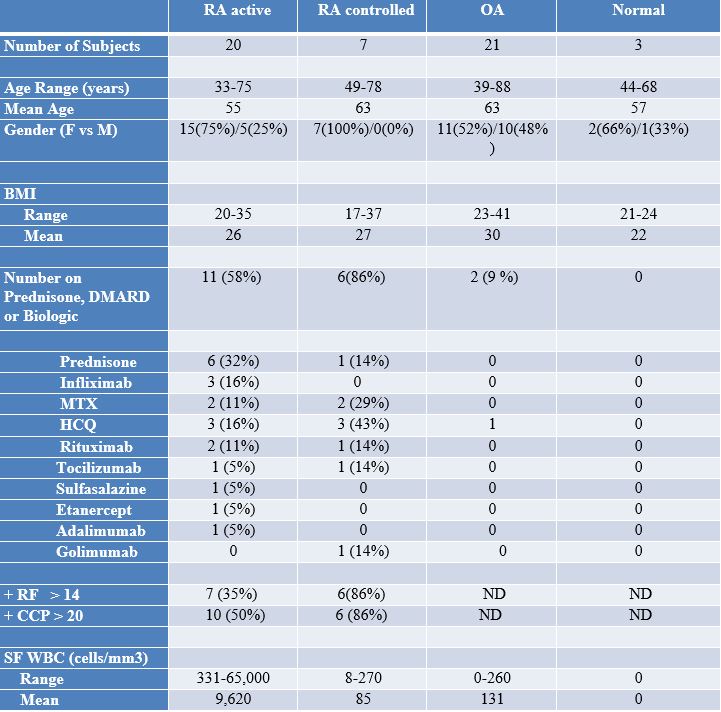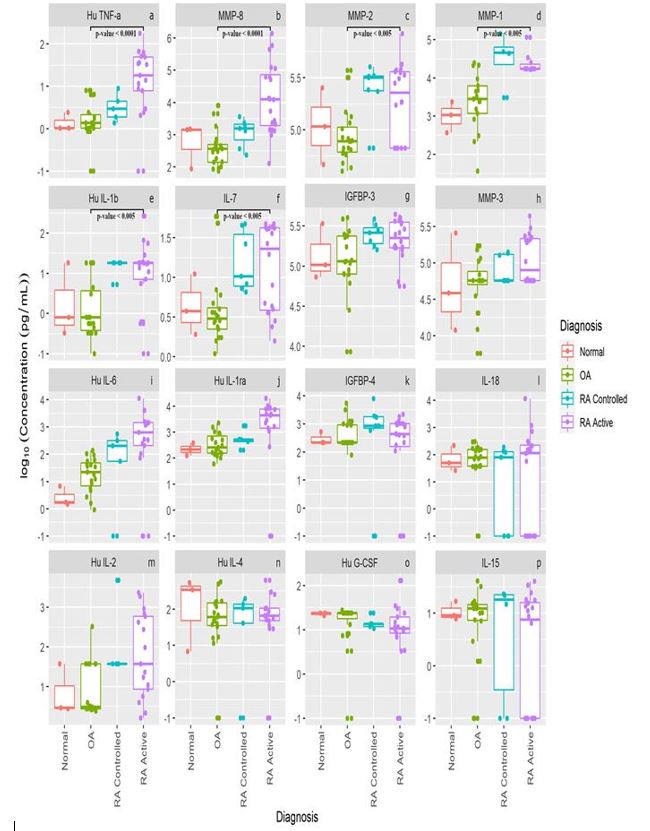Session Information
Session Type: Poster Session C
Session Time: 8:30AM-10:30AM
Background/Purpose: A major limitation of synovial fluid (SF) biomarker studies in osteoarthritis (OA) has been difficulty in obtaining SF (SF) in patients with small effusions. There is growing evidence that osteoarthritis is not simply a degenerative process but rather cartilage loss is associated with low grade inflammation which can damage chondrocytes and the extra cellular matrix. There is also little information on WBC counts, or the levels of cytokines, MMPs and other proteins in SF from normal knees. To compare differences, a panel of 16 protein biomarkers was measured in knee SF from osteoarthritis (OA) patients, rheumatoid arthritis (RA) patients and normal knees.
Methods: SF was obtained prior to an intra-articular therapeutic injection or a diagnostic arthrocentesis from 21 OA, 27 RA patients as well as 3 normal subjects, using ultrasound (US) guidance and an external pneumatic compression device. All subjects were consented to have remaining SF placed into an IRB approved SF biomarker research protocol. RA patients were categorized as active (n= 20) or controlled (n= 7) disease based upon their SF white blood cell counts (> or < 300 cells/mm3). Samples were cryopreserved and analyzed by multiplex fluorescent bead assays (Luminex) within 60 minutes of aspiration. Between group differences were identified using ANOVA on log10 transformed concentrations with p values adjusted for multiple testing.
Results: The demographic and clinical features from the 4 groups of subjects are presented in Table 1 including age, gender, BMI, serology, SF WBC counts and drugs taken at the time of knee aspiration. The SF log 10 concentrations of each of these 16 proteins from the 4 groups of subjects are presented in Figure 1. The first 6 panels display p values differences between Active RA and PA patients. Six of the biomarkers were significantly higher in SF from active RA compared to OA (TNF –alpha, IL-1 beta, IL-7, MMP-1, MMP-2, MMP 3) whereas none of the other 10 cytokines, chemokines, MMPs and other proteins (IGFBP-3, MMP-3, IL-6, IL-1ra, IGFBP-4, IL-18, IL-2, IL-4, G-CSF and IL-15) were significantly deferent between OA and Active RA patients. The lack of statistical differences in some of these proteins is most likely due to the large variance in levels from several individual patients and possibly due to medications taken at the time of aspiration as listed in Table 1. SF MMP-8 levels was the only protein which correlated with WBC counts (p< 0.001).
Conclusion: The fact that only 6 of 16 proteins were significantly higher in SF from Active RA patients compared to those with OA is additional evidence that a pro inflammatory process in OA may lead to further cartilage loss in additional to mechanical factors and genetic predisposition. The results of this small study suggest that normal knee SF may not have any WBCs and that IL 4 as well as other cytokines and even MMPS might be important in maintaining cartilage homeostasis. SF collection using US guidance with external compression combined with a multiplex biomarker panel may help distinguish clinical subtypes and enhance development of disease modifying drugs for OA.
 Demographics and immunomodulatory drug use among patients with OA, RA active, RA controlled and normal subjects
Demographics and immunomodulatory drug use among patients with OA, RA active, RA controlled and normal subjects
 Synovial fluid cytokine, chemokine, MMP and other proteins levels from patients with OA compared to patients with RA active, RA controlled and normal subjects.
Synovial fluid cytokine, chemokine, MMP and other proteins levels from patients with OA compared to patients with RA active, RA controlled and normal subjects.
To cite this abstract in AMA style:
Meehan R, Regan E, Hoffman E, Wolff M, Gill M, Crooks J, Parmar P, Scheuring R, Hill J, Pacheco k, Knight V. Synovial Fluid Cytokines, Chemokines, and MMPs in Osteoarthritis Patients with Knee Pain Compared to RA Patients and Normal Knees [abstract]. Arthritis Rheumatol. 2021; 73 (suppl 9). https://acrabstracts.org/abstract/synovial-fluid-cytokines-chemokines-and-mmps-in-osteoarthritis-patients-with-knee-pain-compared-to-ra-patients-and-normal-knees/. Accessed .« Back to ACR Convergence 2021
ACR Meeting Abstracts - https://acrabstracts.org/abstract/synovial-fluid-cytokines-chemokines-and-mmps-in-osteoarthritis-patients-with-knee-pain-compared-to-ra-patients-and-normal-knees/
